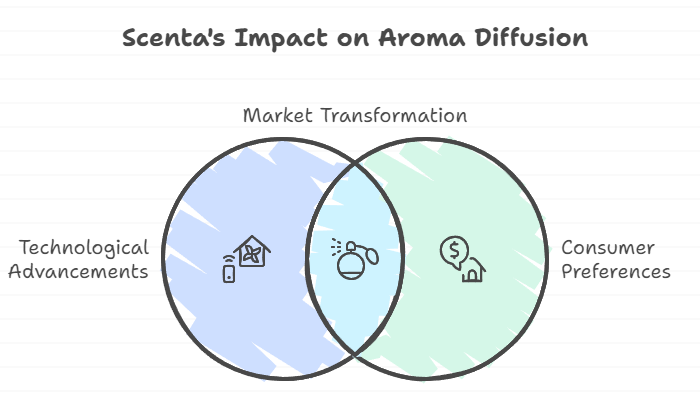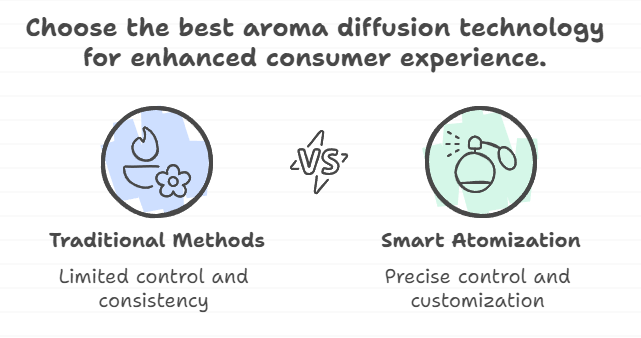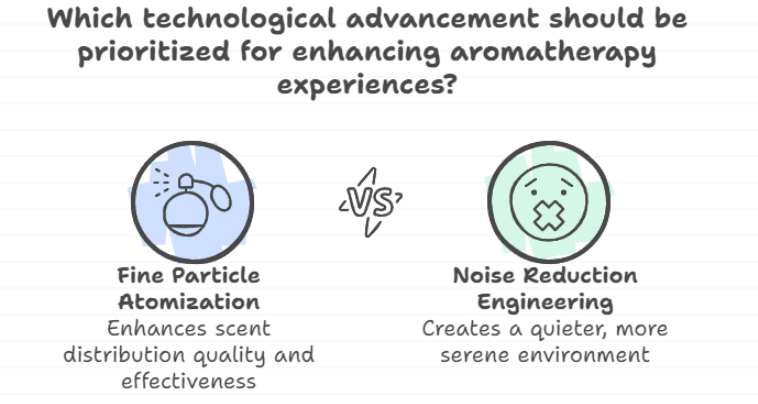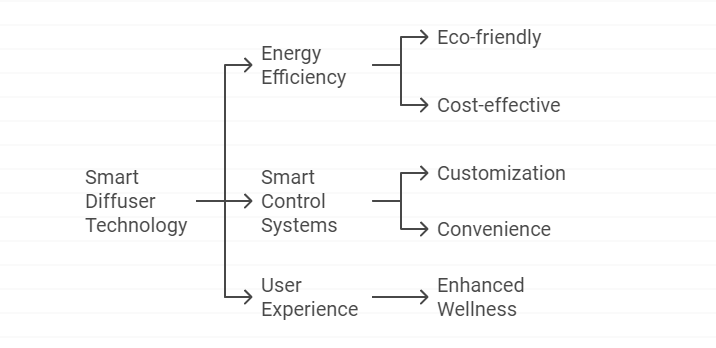您的购物车目前是空的!
The evolution of aroma oil diffusion technology: How Scenta is reshaping industry standards
·
Posted by

Evolution of Aroma Oil Diffusion Industry

The aroma oil diffusion industry has experienced a significant transformation, evolving from a simple array of traditional diffusers to a sophisticated blend of technology and wellness. This shift is marked by the emergence of companies like Scenta, which have pioneered innovative solutions in the field.
Changing Consumer Preferences
Consumer preferences have played a crucial role in driving this evolution. There is a growing demand for premium, customizable aromatherapy experiences that cater to individual needs and lifestyles. Consumers are increasingly seeking products that offer more than just basic functionality, leading to a focus on advanced features and user-friendly design.
Technological Innovations
Technological advancements have been at the heart of this transformation. Smart diffuser technology, exemplified by Scenta’s offerings, integrates advanced Internet of Things (IoT) capabilities. These innovations enable users to control and customize their aromatherapy experiences through smartphones and other connected devices, enhancing convenience and personalization.
Setting New Industry Standards
Scenta and similar innovators are setting new industry standards by pushing the boundaries of what diffusers can do. The integration of IoT capabilities not only meets the rising demand for high-quality, customizable experiences but also addresses significant industry challenges such as energy efficiency, safety, and user experience.
Overcoming Industry Challenges
The fusion of wellness and technology is helping to overcome several industry challenges. For instance, smart diffusers can be programmed to release essential oils at specific times, ensuring consistent and effective aromatherapy. They also provide real-time feedback and remote control options, enhancing user safety and satisfaction.
Conclusion
In conclusion, the aroma oil diffusion industry is undergoing a profound transformation, driven by technological innovations and evolving consumer preferences. Companies like Scenta are leading the way by integrating advanced IoT capabilities, setting new industry standards, and providing premium, customizable aromatherapy experiences that meet the needs of modern consumers.
This article aims to give a complete overview of the future outlook for the aroma oil diffusion industry. It will cover everything from how consumers are changing to the technical improvements that are driving market growth.
Market Transformation Analysis
In the rapidly changing landscape of the Aroma Diffusion market, one of the most notable shifts is the transition from traditional diffusion methods to advanced smart atomization technology. This technological leap has revolutionized how consumers experience aromatherapy, moving away from the limitations of conventional reed diffusers and heated oil burners. Smart atomization technology offers precise control over scent distribution, ensuring a more consistent and effective aromatherapy experience. This shift is not just a technological upgrade; it represents a fundamental change in how consumers interact with and benefit from aromatherapy.
The driving force behind this transformation is the growing consumer demand for premium aromatherapy solutions. Today’s consumers are more discerning and informed than ever, seeking products that not only provide wellness benefits but also enhance their lifestyle. People want high-quality, customized experiences. This has led to the development of smart diffusers that offer a range of personalized settings, from how strong the scent is to when and how often they should be used. This trend highlights the increasing importance of wellness device innovation in meeting the evolving needs of consumers who prioritize their well-being and self-care routines.

A significant contributor to this market transformation is the integration of IoT and smart home technologies. Smart diffusers are no longer standalone devices; they are now part of a broader ecosystem of connected home appliances. This integration allows users to control their aromatherapy experiences remotely, using mobile apps or voice assistants. The convenience and flexibility offered by these technologies have made smart diffusers an essential component of modern smart homes. The ability to sync aromatherapy sessions with other smart home features, such as lighting and temperature control, creates a holistic wellness environment that aligns with the modern consumer’s lifestyle.
Furthermore, the emergence of commercial-scale applications is another key aspect of this market transformation. Smart diffuser technology is not only used in homes. It is also being used more and more in businesses, like hotels, spas, offices, and stores. This expansion into the business world shows how Smart Diffuser Technology can be used to improve customer experiences and create welcoming environments. As businesses see the benefits of aromatherapy in improving customer satisfaction and employee productivity, the demand for commercial-scale solutions keeps growing. This is leading to more innovation and development in the Aromatherapy Industry Trends.
Technical Innovation Trends
The aroma oil diffusion industry is witnessing a remarkable transformation driven by cutting-edge technological advancements. One of the most important new ideas is the development of very fine particle atomization technology. This technology greatly improves the quality and effectiveness of scent distribution. This breakthrough ensures that essential oils are dispersed more evenly and efficiently, leading to a more impactful aromatherapy experience. Aromatherapy industry trends are clearly moving towards a future where precision and performance are paramount, enabling users to derive maximum benefits from their wellness routines.
Another pivotal advancement is the strides made in noise reduction engineering. Traditional diffusers often produce disruptive sounds that could detract from the overall relaxing experience. However, modern smart diffusers are made with the latest noise reduction technologies. This means that diffusion systems work more quietly than ever before. This quiet operation is particularly crucial in settings where peace and tranquility are essential, such as spas, meditation rooms, and bedrooms. The focus on reducing noise levels underscores the industry’s commitment to creating a truly immersive and serene wellness environment.

Energy efficiency has also emerged as a critical area of improvement in the Aroma Diffusion market. With sustainability becoming a global priority, smart diffuser technology is leading the charge in making these devices more eco-friendly and cost-effective. Many smart diffusers now have advanced energy-saving features and a better way to use power. This lets users enjoy their aromatherapy experiences without feeling guilty about using too much energy. This trend not only helps the environment but also saves money to use. This makes smart diffusers more appealing to both home and business users.
Furthermore, the integration of smart control systems is revolutionizing user experiences by offering greater customization and convenience. Users can now control their diffusers through mobile apps or voice assistants, allowing for unprecedented flexibility and control over their aromatherapy sessions. Smart Diffuser Technology lets you change the scent intensity, set timers, or choose specific oil combinations. This makes it possible to personalize your diffuser in a way that was not possible before. This seamless integration with smart home technologies transforms diffusers into essential wellness devices, enhancing the overall lifestyle experience of users.
In summary, Wellness Device innovation in the aroma oil diffusion industry is not just about technology improvements. It is about creating a holistic wellness experience that meets the changing needs of consumers. The industry is setting new standards that focus on user satisfaction and sustainability. These include ultra-fine particle atomization, noise reduction, and energy efficiency. As these innovations continue to reshape the essential oil technology landscape, the future of aromatherapy looks brighter and more advanced than ever before.

Consumer Behavior Changes
Aromatherapy industry trends are witnessing a significant shift driven by evolving consumer behaviors. As individuals increasingly prioritize home wellness and self-care, the demand for sophisticated aromatherapy solutions has surged. Consumers are no longer content with basic diffusers; they seek advanced smart diffuser technology that offers personalized and immersive aromatherapy experiences. This shift is reflected in the growing popularity of devices that allow users to customize scent intensity, duration, and even blend different essential oils to create unique aromas tailored to their preferences and moods.
Moreover, consumers are becoming more environmentally conscious, influencing their purchasing decisions within the aroma diffusion market. There is a rising demand for products that not only enhance wellness but also minimize their environmental footprint. This includes diffusers that use eco-friendly materials, have energy-efficient designs, and can purify the air while dispersing scents. The emphasis on sustainability and air quality is pushing manufacturers to innovate and develop essential oil technology that meets these stringent requirements, ensuring that consumers can enjoy the benefits of aromatherapy without compromising on their eco-friendly values.
Another notable trend is consumer preference for versatile wellness devices. People are more and more interested in products that can do many things. This includes diffusers that can also be humidifiers, air purifiers, or even smart speakers. This multifunctionality appeals to consumers who want to maximize the utility of their purchases and create a comprehensive wellness environment in their homes. Wellness device innovation is driven by people’s desire for convenience and efficiency. Consumers want products that fit into their daily routines and improve their overall health.
In addition, the rise of smart home technology has further influenced consumer behavior. Users are increasingly looking for smart diffuser technology that can be seamlessly integrated into their existing smart home ecosystems. This includes features like voice control, app-based management, and automation capabilities. The ability to control the aromatherapy experience from a distance and connect it with other smart home devices creates a healthy environment that is connected and personalized. This makes these advanced diffusers more appealing.
These changes in consumer behavior are not only driving the growth of the aroma diffusion market but also shaping the direction of its technological advancements. Manufacturers are responding to these trends by spending money on research and development to make products that fit the changing needs and preferences of consumers. This will eventually change industry standards for aromatherapy experiences.

Industry Challenges and Solutions
The aroma oil diffusion industry, while experiencing significant growth and innovation, is not without its challenges. One of the primary hurdles is adhering to stringent environmental sustainability standards. As consumers become increasingly eco-conscious, there is a growing demand for products that minimize environmental impact. Companies like Scenta are fixing this by using green materials and making products that last. They make sure their products match wellness device innovation trends while reducing their carbon footprint.
Another critical challenge is balancing high performance with energy efficiency. Smart diffuser technology, while offering advanced features, must also be energy-efficient to appeal to a broader market. Scenta tackles this by incorporating efficient atomization techniques and smart sensors that optimize energy use without compromising performance. These innovations not only enhance the user experience but also contribute to the overall sustainability of the Aromatherapy Industry Trends.
Catering to the diverse needs of various market segments is another significant obstacle. Consumers have unique preferences and requirements, from personal use in homes to commercial applications in businesses. Scenta addresses this by offering a range of customizable options and advanced features that can be tailored to different settings. This includes programmable scent schedules, the ability to spread scent across many rooms, and integration with other smart home devices. This makes their products useful and appealing to many users.
Ensuring consistent quality control in mass production is a challenge that requires meticulous attention to detail. To maintain high standards, Scenta employs rigorous quality control measures throughout the manufacturing process. This includes thorough testing of each unit, adherence to strict quality guidelines, and continuous improvement of their production methods. Scenta makes sure that their Smart Diffuser Technology meets the needs of both consumers and businesses by focusing on quality. This helps to build trust and loyalty in the Aroma Diffusion market.
Furthermore, the rapid advancement in Essential Oil technology necessitates continuous innovation to stay ahead of the competition. Scenta invests heavily in research and development to create cutting-edge solutions that offer superior aromatherapy experiences. Scenta stays at the forefront of technology by meeting the changing needs of the market and setting new industry standards. This helps the company grow and innovate in the future.

Future Industry Outlook
The aroma oil diffusion industry is set to grow a lot because of aromatherapy industry trends and technological improvements. As consumers more and more focus on health and personalized experiences, the need for new, customizable aromatherapy solutions is expected to increase. This growth will be supported by the continued improvement of Smart Diffuser Technology. It will become even more connected to other smart home devices, making it easier and simpler for users to use.
Future developments in the Aroma Diffusion market are likely to be characterized by a deeper integration of artificial intelligence and machine learning. These technologies will enable diffusers to learn and adapt to user preferences, optimizing scent intensity, duration, and combinations based on individual needs and environmental conditions. Such advancements will not only enhance the effectiveness of aromatherapy but also create a more personalized wellness experience for users. The industry is expected to see more new wellness devices. These devices will combine aroma diffusion with other wellness methods like light therapy, sound therapy, and air purification.
The regulatory landscape is also anticipated to evolve in response to the industry’s growth. As smart diffusers become more common in homes and businesses, regulators may add new rules to make sure they are safe and work well. This could include more stringent guidelines on the quality and sourcing of essential oils, as well as the technical performance of diffuser devices. Companies that stay ahead of these regulatory changes and prioritize transparency and sustainability will be well-positioned to lead the market.
Moreover, the industry is likely to explore new applications and use cases for aroma diffusion. Smart diffusers can be used in places other than just for wellness. They could be added to workplaces to help people focus and work better, or in schools to help students learn and reduce stress. The potential for Essential Oil Technology to improve Essential Oil Technology could help improve air quality and reduce the spread of airborne diseases. This is another area that is ready for research.efits of aromatherapy, the industry will have ample opportunities to innovate and grow.

